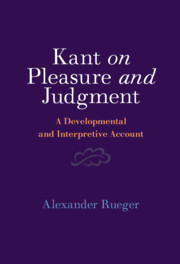Book contents
- Kant on Pleasure and Judgment
- Kant on Pleasure and Judgment
- Copyright page
- Contents
- Acknowledgments
- Abbreviations
- Introduction
- 1 The Early Reception of the Third Critique
- 2 The Completion of the System of the Powers of the Mind, 1770–1790
- 3 Kant’s Theory of the Feeling of Pleasure and Displeasure (I)
- 4 Kant’s Theory of the Feeling of Pleasure and Displeasure (II)
- 5 Consequences of the Theory
- 6 The Principle(s) of the Power of Judgment
- 7 The Interest of the Reflecting Power of Judgment and the Deduction of Judgments of Taste
- 8 The Imagination in Its Freedom
- 9 The Transition from Nature to Freedom
- Conclusion
- Bibliography
- Index
6 - The Principle(s) of the Power of Judgment
Published online by Cambridge University Press: 19 April 2024
- Kant on Pleasure and Judgment
- Kant on Pleasure and Judgment
- Copyright page
- Contents
- Acknowledgments
- Abbreviations
- Introduction
- 1 The Early Reception of the Third Critique
- 2 The Completion of the System of the Powers of the Mind, 1770–1790
- 3 Kant’s Theory of the Feeling of Pleasure and Displeasure (I)
- 4 Kant’s Theory of the Feeling of Pleasure and Displeasure (II)
- 5 Consequences of the Theory
- 6 The Principle(s) of the Power of Judgment
- 7 The Interest of the Reflecting Power of Judgment and the Deduction of Judgments of Taste
- 8 The Imagination in Its Freedom
- 9 The Transition from Nature to Freedom
- Conclusion
- Bibliography
- Index
Summary
What is the a priori principle of the new faculty? Kant apparently gives two answers in the Critique: First, he presents a ‘principle of systematicity’ that is supposed to authorize us to regard nature as a system with respect to its particular, or empirical, laws. This is also paraphrased as the principle that for every object in nature an empirical concept can be found, and Kant provides a transcendental deduction for it. Satisfaction of the principle is accompanied by pleasure, but it seems clear that this cannot be the pleasure of taste. A second principle is later entitled the principle of taste. The relation, if any, between these principles is a long-standing problem. I focus in this chapter on the first formulation and attempt to elucidate the role it plays in guiding the imagination in the process of concept formation and discuss the relation of the principles in Ch.7.
Keywords
- Type
- Chapter
- Information
- Kant on Pleasure and JudgmentA Developmental and Interpretive Account, pp. 106 - 124Publisher: Cambridge University PressPrint publication year: 2024

